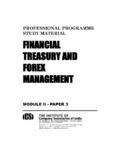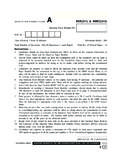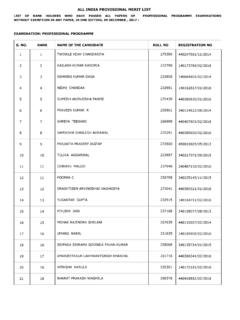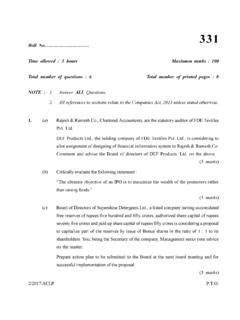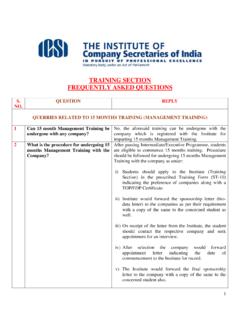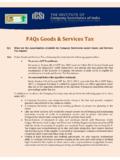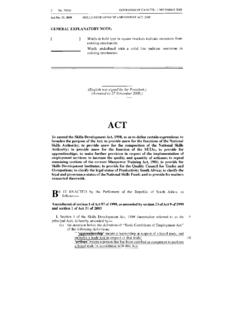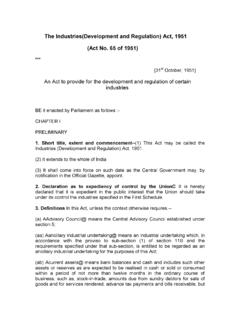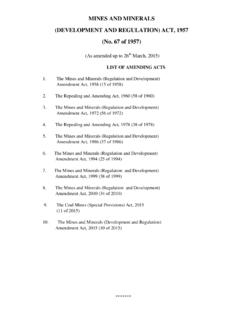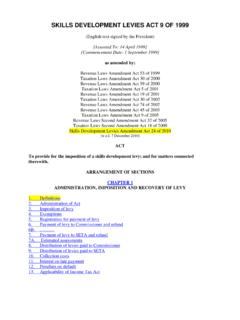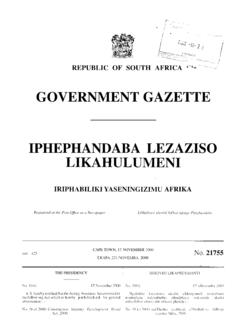Transcription of Real Estate (Regulation and Development) Act, …
1 real Estate (Regulation and Development) Act, 2016(RERA)July 2017 Price : Rs. 150/- (Excluding postage) THE INSTITUTE OF COMPANY SECRETARIES OF INDIAAll rights reserved. No part of this book may be translated or copied in anyform or by any means without the prior written permission of The Institute ofCompany Secretaries of by :THE INSTITUTE OF COMPANY SECRETARIES OF INDIAICSI House, 22, Institutional Area, Lodi RoadNew Delhi - 110 003 Phones: 45341000, 41504444 o Fax : 24626727E-mail: Website : at Chandu Press /100/July 2017(ii)PREFACEOver the past decades, India has emerged as one of the few worldeconomies with a combination of healthy economic perspective andsuccessive growth at global platform, amidst the mood of cynicism andreservations of emerging economies. It is widely accepted that India ison its road to global growth and emerging as a prospective world leaderregistering sustainable development to a bid to ensure sustainable growth and development of the nationalong with the welfare of entire populace the Government has directedthoughtful focus on each and every driver contributing to the growth ofIndian economy.
2 This perspective is well reflected in various governmentinitiatives, such as, various economic reforms, legal transformations,implementing structural changes, and focusing on fundamental growthof various sectors: small, micro, medium and Estate Sector, which seems to be one of the major contributors inthe inclusive growth of the nation with the contribution of oftotal GDP and growth rate to the tune of 30% is also clutching the shareof its regulatory attention. Significant performance of real Estate Industrywith the significant rights and liabilities involved in the transactions hasfetched the government attention for proper policy and regulation ofreal Estate sector. This led to a deep-seated legal transformation in theform of real Estate (Regulation and development ) Act, structure of the law with focus on regulation as well as developmentof the real Estate sector including the capping on realization,establishment of RERAs and specialized Appellate Tribunals, Registrationwith Regulatory Authorities, Internal Audit and Valuations has enhancedthe role of professionals in ensuring effective, oriented and directedimplementation of this law in the a view to advance the knowledge and to build the capacity ofprofessionals, stakeholders, members of the industry, experts in the RealEstate (Regulation and development ) Act, 2016, the Institute publishedthis commend the dedicated efforts put in by Mr.
3 Chittaranjan Pal, AssistantDirector, and CS Pankila Bhard waj, Consult ant (Pr ofessionalDevelopment, Perspective Planning & Studies) for in preparing themanuscript and finalizing the publication under the guidance of CS SoniaBaijal, Director, ICSI. I am also thankful to CS Manoj Agrawal, Group(iii)(iv)Company Secretary, Shristi Infrastructure and CS (Dr.) Sanjeev Kumar,Executive Director, Bajaj Hindustan Sugar Limited for their value additionmade to the am sure that this publication would certainly facilitate the understandingof the professionals, members and students on various facts and facetsof real Estate (Regulation and development ) Act, 2016 and would enrichtheir knowledge on this new : New Delhi CS (Dr.) Shyam AgrawalDate : 18 July, 2017 PresidentThe Institute of Company Secretaries of IndiaC O N T E N T Framework real Estate (Regulation andDevelopment) Act, of real Estate Project and Registrationof real Estate and Duties of and Duties of real Estate Regulatory Advisory real Estate Appellate of Company , Penalties and Agreement for Sale to be Executedbetween the Promoter and the s on real Estate (Regulation and Development) Act, 201676(v)Currently, more and more researches are being conducted in relation to the promotionof the sustainable development in several areas to allievate the relevant problem.
4 Since sustainability and sustainable development encompases economic security andgrowth, environmental quality and integrity, social cohesion and quality of life,empowerment and governance, hence, the role of the real Estate sector in the promotionof the sustainable development become predominant, because it involves one of thebasic pursuit of life, viz, roti, kapda and makan and thus has major impact on the stateof socio-economic status. Since real Estate is inseparable from human economy in itssocial form, and all plans of social reform must be directed toward an appropriatedistribution of economic goods including housing and infrastructure. There exists ahuge demand for housing and infrastructure in the Indian scene. For achieving the goalof Housing for All , we need to build millions of houses both in urban and rural urban housing shortage is estimated at million in 2015.
5 Total rural housingshortage in India stood at million as of 2015 and is expected to grow to by the end of 2017. Demand for residential space in Low Income Group categoryremained 40% whereas supply was much behind at 22% a demand supply gap of18%. Similarly, demand-supply gap in Middle Income Group and High Income Groupcategories stood at 20% and 2% respectively. The housing sector alone contributes 5-6 per cent to the country's Gross Domestic Product (GDP). real Estate , as a general term, describes the built environment, which plays a vital rolein every aspect of an economy, society and environment. Businesses and society can'tfunction without the services of commercial property, including the provision of offices,shops, factories, malls and many other forms of real Estate . The commercial propertysector delivers and manages the infrastructure needed for entrepreneurship to thrive.
6 Itis therefore a fundamental source of employment and economic growth, and a majorcontributor in addressing two critical challenges of our time: providing liveable andfunctioning cities for a growing urban population and reducing the environmental footprintof the built real Estate has a catalytic role in fulfilling the demand for housing for the varioussocio-economic classes. Equally important is need to provide the back up infrastructurecovering utility services such as water supply, sewerage, drainage, roads and transportrequirements as well as social infrastructure like schools, health and recreation facilities,commercial infrastructure like markets/malls, office complexes, technology parks cumulative effect of these demands places the onus on the real Estate andconstruction sector, providing an excellent opportunity for conferring social benefitswhich could act as a major vehicle for kick-starting the Estate (Regulation and development ) Act, 2016 (RERA)2 IBEF Report (2016) estimates that India s real Estate sector s market size is expected togrow upto USD180 billion by 2020 from billion in 2014, that reflects an increaseof times.
7 It is further estimated to be worth USD853 billion by 2028. Further, realestate sector is the fourth largest sector in terms of FDI inflows which is estimated togrow to USD25 billion by FY22. The number of Indians living in urban areas are increasingrapidly and are expected to be about 600 million in Indian economy experienced robust growth in the past decade and is expected tobe one of the fastest growing economies in the coming years. It has also been estimatedthat real Estate contribution to India s GDP is estimated to increase to about 13 per centby 2028. Increasing share of real Estate in the GDP would be supported by increasingindustrial activity, improving income level, and urbanisation. The growth of real estatesector is not only driven by growing economy but policy support from government aswell. For instance, Government plans to build 100 smart cities which would reduce themigration of people to metro and other developed cities.
8 Government initiatives suchas various urban development policies and programmes ( , JNNURM, Land AcquisitionAct. Affordable Housing, Ease in housing finances, Widening the scope of real estatemarket, change in FDI Regulation) are expected to contribute to enhanced and growing household incomes are driving demand for residential realestate and growth in the retail sector. India s urban population as a percentage of totalpopulation was around per cent in 2016 and is expected to rise to 40 per cent by2030. Industry players, including realtors and property analysts, are rooting for thecreation of "Special Residential Zones" (SRZs), along the lines of SEZs.** real Estate (Regulation and development ) Act, 2016 (RERA)3 real Estate sector plays a catalytic role in fulfilling the needs and demand for housingand infrastructure in the country and is an important pillar of the economy.
9 While thissector has grown significantly in recent years, it has been largely unregulated, withabsence of professionalism and standardisation and lack of adequate consumer has no sectoral regulator like there are for other specific sectors like insurance, telecom,stock markets etc. History is witness to the fact that whenever sectoral regulators likeSEBI, IRDAI, TRAI etc have been formed, they have helped in deepening the marketand made it more robust. Though the Consumer Protection Act, 1986 is available as aforum to the buyers in the real Estate market, the recourse is only curative and is notadequate to address all the concerns of buyers and promoters in that sector. The lack ofstandardisation has been a constraint to the healthy and orderly growth of , since more than a decade the need for regulating the sector was beingemphasised in various view of the above, Parliament enacted the real Estate (Regulation and Development) Act, 2016 which aims at protecting the rights and interests of consumers and promotionof uniformity and standardization of business practices and transactions in the real estatesector.
10 It attempts to balance the interests of consumers and promoters by imposingcertain responsibilities on both. It seeks to establish symmetry of information betweenthe promoter and purchaser, transparency of contractual conditions, set minimumstandards of accountability and a fast-track dispute resolution Act will be put in operation just like the Motor Vehicles Act passed by the CentralGovernment, pursuant to which respective State Governments ( SG ) and Union Territories( UT ) are required to notify their own Rules, which would be in the lines of the CentralAct and accordingly administer their own State Rules. Accordingly, every SG and UT areto required to promulgate their own real Estate Rules which would be based on thelines of the central real Estate (Regulation and development ) Act 2016, and establish aReal Estate Regulatory Authority ( RERA ) pursuant to the Rules, which will administerthe respective real Estate Rules of the State or UT.
